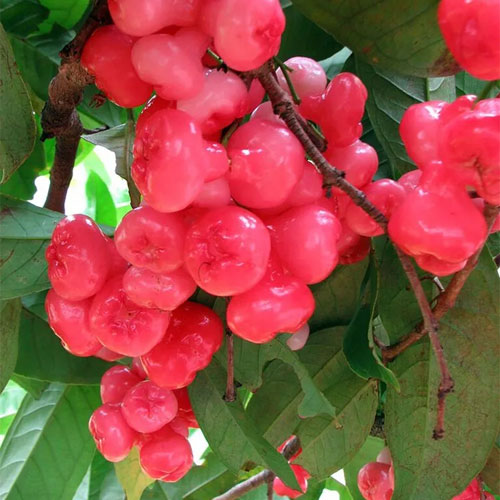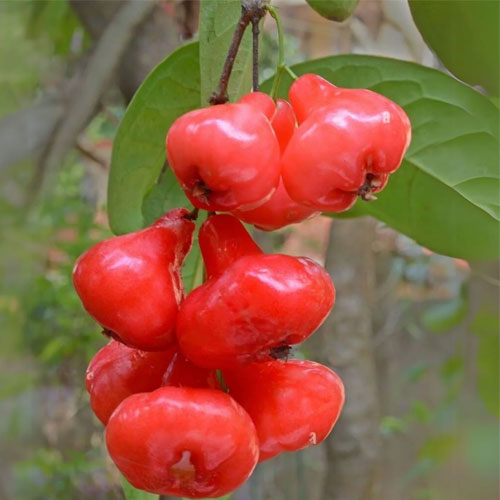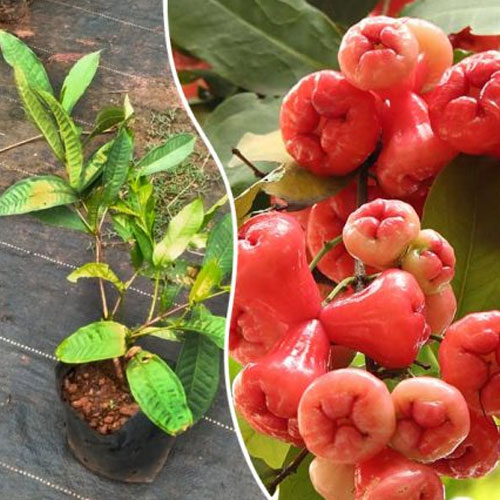Bring home the Rose Water Apple Chamba Java Live Plant, a tropical treasure known for its juicy, mildly sweet fruits and fragrant pink-white flowers. Also called Java Apple or Chamba Pazham, this plant produces bell-shaped fruits that are crisp, refreshing, and hydrating—perfect for summer. Loved for both its ornamental beauty and edible fruits, the Rose Water Apple is an easy-to-grow tropical fruit tree that thrives in warm Indian climates.
This is a seedling plant, healthy and around 1 to 1.5 feet in height, perfect for home gardens, terraces, farms, or edible landscapes. With proper care, it begins fruiting in a few years and can grow into a small tree with high yield potential. A wonderful choice for home gardeners who want both beauty and bounty in their garden.
Type of Plant: Fruit Plant (Seedling)
Variety Name: Rose Water Apple / Chamba Java
Botanical Name: Syzygium samarangense
Sunlight Requirements: Full sun (6–8 hours daily)
Where to Grow: Outdoor garden, farm, terrace in large pots
Growing Season: Best planted in spring and early monsoon
Planting Depth: Plant root ball level with the soil
Ideal Climate: Tropical and coastal warm regions
Plant Height: 1 to 1.5 feet (can grow 10–15 feet)
Fertilizer Needs: Organic compost or cow dung every 30 days
Life Span: Perennial tree (15+ years)
Ideal Growing Temperature: 22°C – 35°C
Harvesting Time: 2–3 years after planting (fruits in summer)
Maintenance Required: Moderate
Watering Frequency: Water every 2–3 days during dry periods
Ideal Grow Bag Size: 18x18 or 24x24 inch grow bag



In India, the ideal time to plant Rose Water Apple (Chamba Java) is during spring and the onset of the monsoon (February to July). This helps the seedling establish roots quickly with natural rain support. In tropical regions like Kerala, Tamil Nadu, or Maharashtra, the plant can grow year-round if given adequate care.
To grow this plant in pots, choose a strong 18 to 24 inch grow bag or container. Ensure good drainage. Use rich, well-aerated soil with organic compost. Place the pot in full sunlight and water regularly. Repot every 1–2 years as the plant grows.
This product is a live seedling plant. Propagation is usually done through seeds or air layering, but for faster fruiting, seedlings are preferred. No seed sowing required.
Sunlight: Needs full sun for best growth and fruiting
Soil: Loamy, fertile soil with organic matter
Fertilization: Add vermicompost or cow dung every month
Pruning: Light pruning to shape after fruiting season
Support and Spacing: Tree needs no support; space 6–8 feet apart
Pest Control: Use neem oil spray to prevent ants or scale insects
Disease Prevention: Avoid water stagnation; use antifungal powder if needed
Mulching: Use straw or leaves around base to retain moisture
Harvesting: Pick fruits when they turn red or pink and slightly soft
1. Apply Nutrient-Rich Fertilizers
When your plants begin flowering, use nutrient-rich fertilizers like Organic Bone Meal Powder or Vermicompost. This helps in boosting the bloom and enhances overall yield.
2. Use Organic Fertilizers
Feed your plants with organic fertilizers such as Cow Dung Manure or Neem Cake. Organic options promote healthy soil life.
3. Regular Feeding
Apply fertilizers every 20-25 days to ensure plants receive a steady supply of nutrients. Choose from various options like Cocopeat Compost for moisture retention.
Beautiful glossy leaves and fragrant seasonal flowers
Produces bell-shaped rose-scented fruits
Excellent choice for summer hydration due to high water content in fruits
Grows well in tropical regions of India
Both ornamental and edible – adds value to home gardens
Ideal for health-conscious gardeners looking for organic fruit at home
Eaten fresh or made into juices and salads
Traditional use in Ayurveda as a coolant and digestive
Attractive landscape tree with ornamental and edible use
Ideal for kids' gardens due to its juicy, mild-sweet flavor
Grows easily without the need for excessive maintenance
Do not expose young seedlings to harsh sun in the first month
Always use well-drained soil to prevent fungal issues
Watering must be regular but avoid overwatering
Protect from frost in high-altitude regions
Use organic methods for pest and disease control
Leaf Curl: Often due to pest attacks – treat with neem oil
Fruit Drop: Overwatering or poor pollination – adjust watering and attract pollinators
Slow Growth: Ensure sunlight and organic feeding schedule
Yellowing Leaves: May be due to nutrient deficiency – add compost and micronutrients
Insect Infestation: Use soap water spray or neem-based solutions
Chamba Pazham, Panineer Sebu, Rose Sebu, Chambakka, Chambang, Paneer Pala, Java Apple, Panneer Pazham, Chambakka Fruit Plant
Q1: How long does it take for the plant to bear fruit?
Usually 2 to 3 years under ideal care and sunlight.
Q2: Can this plant be grown on a terrace?
Yes, in a large 18x18 or 24x24 grow bag with proper sunlight and watering.
Q3: Are the fruits sweet or sour?
Mildly sweet with a rose-like flavor and juicy texture.
Q4: Is this plant grafted?
No, this is a seedling plant.
Q5: Can it tolerate heavy rains?
Yes, but ensure good drainage to avoid root rot.
Sign in now to receive a 5% instant discount on your first order when using code WELCOME. Begin your organic journey today!
By logging in, you're agreeing to our Terms of Service and Privacy Policy.
Neha Menon
Golden Hills Farm ka product best hai. Healthy aur fresh plant milta hai har baar. 🌱
Vikram Desai
Excellent packaging aur fast-growing plant. Healthy condition me receive hua. 🌿
Anjali George
Plant rare aur healthy tha. Terrace garden ke liye best option. Fast delivery. 👍
Suresh Bhat
Plant well-rooted tha aur soil moist thi. Rare chamba variety ke liye perfect choice. 🌿
Kavya Reddy
Plant healthy tha aur leaves dark green. Fruits ke liye wait kar rahi hu. 🍎
Rajesh Verma
Beautiful glossy leaves aur compact size. Perfect for home garden. Delivery safe thi. 👍
Divya Dutta
Layered plant strong aur stable tha. Pot me shift karne ke baad growth achhi hai. 🌿
Nikhil George
Plant healthy tha par thoda dry lag raha tha. Thoda paani diya aur revive ho gaya. 🌿
Meera Pillai
Healthy aur compact plant. Roots visible aur packaging neat thi. Fast-growing variety hai. 🌱
Harish Rao
Chamba plant acchi condition me mila. Soil moist thi aur delivery bhi fast thi. 🌿